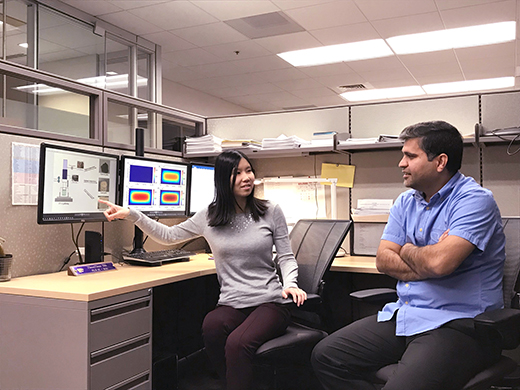Kansas State University research drives wheat straw forward as ethanol fuel source
Wednesday, Nov. 22, 2017

Zhenzhen Shi, left, and Majid Jaberi-Douraki, both with Kansas State University's Institute of Computational and Comparative Medicine, collaborated with researchers at a Chinese university on a project that could aid ethanol fuel production from wheat. | Download this photo.
MANHATTAN — Wheat grown from the heartland may soon fill gas tanks.
Thanks to an international and interdisciplinary collaboration, faculty at Kansas State University's Institute of Computational and Comparative Medicine and bioenergy researchers at Yangzhou University in China have marked a significant milestone for the production of ethanol fuel from wheat.
Their study, "Predictive temperature modeling and experimental investigation of ultrasonic vibration-assisted pelleting of wheat straw," was recently published in Applied Energy, a top-tier journal in the field of energy.
"To the best of our knowledge, previous studies haven't systematically investigated the underlying mechanisms for continuous temperature rise during pellet production, which can hinder effective production of biomass pellets and directly reduce the final ethanol production," said Majid Jaberi-Douraki, an assistant professor of mathematics at the Institute of Computational and Comparative Medicine. "In this case, risk factors resulting in a significant temperature rise need to be identified for improving the pellet production and energy outputs."
Zhenzhen Shi, first author of the study and a postdoctoral fellow at the Institute of Computational and Comparative Medicine, worked with Jaberi-Douraki, a corresponding author, and Qi Zhang, a Kansas State University alumnus and current associate professor of mechanical engineering at Yangzhou University in China. Their work examined factors that affect production of large-scale biomass during ultrasonic vibration-assisted pelleting.
The research team developed a computational and mathematical model to determine factors that impact temperature rise during a pelleting process of biomass. The condensed biomass, or pellets, can be easily handled and transported to make ethanol. Ethanol extracted from pellets can substitute for fossil fuels and mitigate accumulation of greenhouse gases.
By studying the entire pelleting process of biomass, the proposed mathematical model determines the key factors and delivers a new guideline for pellet production by avoiding unnecessary experiments.
"The model was built based on our solid understanding of physical changes of biomass during the pelleting process," Shi said. "We then validated the model using experimental studies. By applying the model recommendation to experiments, we found out the percentage of burned-out pellets was reduced, while the pellet density, pellet durability and sugar yield from pellets were significantly improved."
"Mathematical modeling is a powerful tool because it can save both the time and resources required for experimental studies," Shi said. "By exploring unknown factors during the manufacturing process, this type of work can be further applied to other similar processes with the purpose of predicting biomass production, testing proposed experiments and eventually helping improve decision-making in industry."
The study included support from the Kansas Bioscience Authority. Other collaborative researchers on the publication included Pengfei Zhang with Jiangsu Muyang Holding Co. Ltd., and Zhichao Li with the industry and system engineering department at North Carolina Agricultural and Technical State University. The experimental work of this study was partially supported by National Science Foundation.
The Institute of Computational Comparative Medicine is an interdisciplinary research-based center established in 2013. Housed in newly built facilities in the College of Veterinary Medicine on Kansas State University's Manhattan campus, it was created to develop novel tools to quantitatively bridge in vitro experiments to in vivo endpoints and develop methods to extrapolate chemical, drug and nanomaterial behavior across multiple animal species and man.
